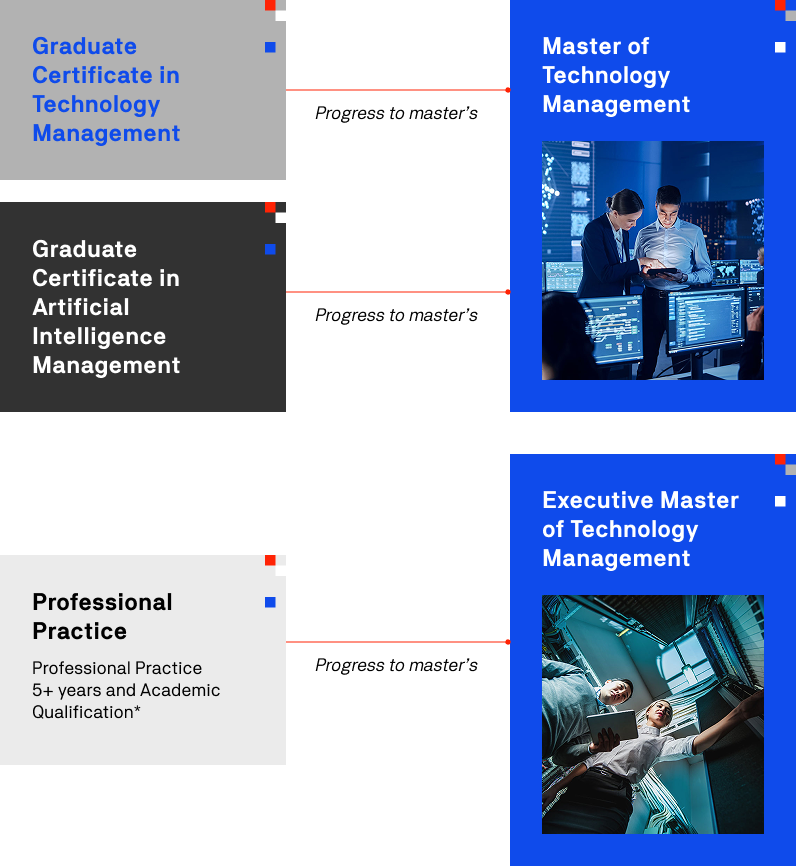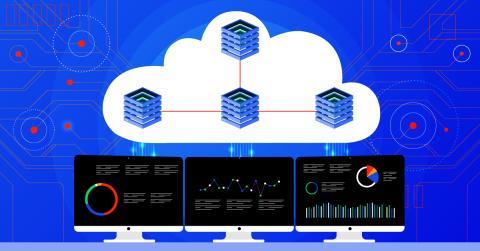Why study the Executive Master of Technology Management with UTS Online?
Australia’s largest Artificial Intelligence research facility4
#2 in Australia for Computer Science1
Top 100 University Globally3
Top 10 in Australia for graduate employability2
1Shanghai Global Ranking of Academic Subjects, 2024. 2QS Graduate Employability Rankings, 2024. 3QS World University Rankings, 2026. 4Australian Artificial Intelligence Institute
Lead a technology-driven future
In the future, the most successful businesses will harness the collective power of technology, people and performance to optimise and improve processes across the enterprise, leading to sustainable and measurable growth.
The UTS Online Executive Master of Technology Management is designed for future-focused professionals who want to take their career to the next level. This course offers an accelerated pathway and focuses on providing strategic and leadership skills within cutting-edge subjects focused on technology and enterprises.
Delivered 100% online, this course enables you to work full-time while attaining the technology management skills to take control of your career. Immediately apply what you learn to make a greater impact in your current role and prepare for a technology-driven future.
Who is this course for?
The Executive Master of Technology Management is suitable for C-suite bound tech professionals who have highly technical degrees with technology-relevant work experience.
Students of this course have extensive technical knowledge from various industries and might work in roles such as:
- IT Operations Director
- IT Manager/Director
- Information Security Manager/Director
- Manager of Technology/Digital Products
- Data Platform Manager
- Data Architect
- Automation Engineer
- User Interface (UI) Engineer
- Solutions Architect
- Engineering Manager
- Software Engineer
- Full-stack Developer
See entry requirements under course information for more eligibility information.
What you will study
The UTS Online Executive Master of Technology Management comprises twelve online subjects (72 credit points (CP) in total).
Students may qualify for Recognition of Prior Learning (RPL) for up to four subjects (equivalent to 24 credit points). This advanced standing enables eligible students to complete the course with just eight subjects, reducing the completion time to as little as 16 months.
Complete the following subjects:
- Digital Strategy: Aligning Business and Technology
- Building Enterprise Agility
Then, apply your skills to a real-world innovation project in your final capstone:
- Innovation Studio
Note: Most UTS Online subjects are valued at 6 credit points each. For detailed subject descriptions and further information, please download a course guide.
Explore our Technology study pathways
Pathway options are available for students who complete a graduate certificate course and wish to progress to the master’s course as well as students who have previous experience in related roles.
Students with the academic qualification required and a minimum of 5 years of professional practice may be eligible for recognition of prior learning (RPL) and could receive up to 4 subjects (24 credit points) of advanced standing toward the Executive Master of Technology Management, reducing the completion time to as little as 16 months.
Students who complete the Graduate Certificate in Technology Management or the Graduate Certificate in Artificial Intelligence Management, may qualify to advance to the Master of Technology Management.
For personalised pathway advice, speak to a Student Enrolment Advisor.
*See Entry Requirements for the Executive Master of Technology Management. Your previous studies or employment experience can be acknowledged as credit towards your online postgraduate studies, provided that it meets the relevant course requirements.
Learning outcomes
Lead enterprise agility and digital transformation
Develop strategic roadmaps to prepare organisations for technological disruption. Build leadership capability to drive change management, enhance agility and future-proof business operations.
Align digital strategy with business objectives
Assess the intersection of technology and business to optimise performance and efficiency. Use strategic foresight and digital expertise to develop solutions that drive innovation and competitive advantage.
Design and implement enterprise technology solutions
Gain hands-on experience in project ideation, research and solution testing. Develop, refine and communicate high-impact technology prototypes that address complex organisational challenges.
Apply executive-level technology leadership in real-world settings
Translate advanced theoretical knowledge into practical enterprise applications. Execute integrated technology management projects, evaluate their impact against industry benchmarks and drive strategic business outcomes.
Course information
Entry requirements
Applicants must have the following:
- Completed Australian bachelor's degree or higher qualification, or overseas equivalent, in Computer Science, Information Systems, Information Technology or Electrical and Electronic Engineering and Technology AND A minimum of 5 years full-time, or equivalent part-time, relevant professional work experience# in a technology management role
#Relevant professional work experience is defined as employment within OSCA groups of ICT Professionals, ICT and Telecommunications Technicians, and ICT Managers.
Applicants who do not meet the criteria above should consider applying for C04434 Master of Technology Management, C11339 Graduate Certificate in Artificial Intelligence Management, or C11341 Graduate Certificate in Technology Management.
Supporting documentation to be submitted with the application
For applicants who need to demonstrate professional work experience:
- Curriculum Vitae AND Statement of service in one of the following formats:
- A 'Statement of Service' provided by the employer
- A completed 'UTS statement of service’ signed by the employer
- A statutory declaration confirming professional work experience (Australian residents only)
- An official letter from the applicant’s accountant or solicitor, on company letterhead, confirming the applicant’s professional work experience or engagement with the business, duration of operations, and nature of the business
- A business certificate of registration in original language and English (e.g. provision of ASIC documentation or ABN or similar documentation for Australian Businesses)
Eligibility for admission does not guarantee an offer of a place.
Want to check your eligibility?
Not only do we have the right tools and support teams to help you – we have people who care about your success.
Career outcomes
The UTS Online Executive Master of Technology Management is tailored for senior professionals aiming to lead at the forefront of technological innovation and strategic management. This course provides advanced insights into technology governance, leadership and transformation.
Upon completion, graduates can pursue senior roles such as:
- Chief Technology Officer (CTO)
- Digital Transformation Executive
- Innovation Director
- Technology Governance Advisor
- Strategy and Innovation Consultant
$165,000
Average salary
Graduates of the Executive Master of Technology Management can expect an average annual salary of $165,000, based on roles such as Chief Technology Officer (CTO), Digital Transformation Executive, Innovation Director, and Strategy and Innovation Consultant.
(Talent.com)
Tech management roles growing 2x faster
Technology management job opportunities are expanding almost twice as fast as the overall job market, reflecting strong and sustained demand for digital leadership and innovation.
(Jobs and Skills Australia)
300,000
Tech Workers by 2030
Australia requires an additional 300,000 tech workers by 2030 to support its AI agenda and technological growth, highlighting critical demand for skilled professionals.
(The Australian)
Upcoming intakes
UTS Online courses have 6 intakes per year. The diagram below shows all upcoming intakes. Our next intake is highlighted below.
-
Jan
2026 -
Mar
2026 -
May
2026 -
Jun
2026 -
Aug
2026 -
Oct
2026
Meet our Course Director
“There is no doubt that technology is changing the way we live and work. The collective power of technology, people, cross-disciplinary approaches and performance can lead businesses to optimise and improve processes across the enterprise, leading to sustainable and measurable business growth.”
Valerie Gay is an Associate Professor in the Faculty of Engineering and IT; a researcher in mobile technologies, digital health and social innovation; and the director of the Master of Technology Management course. Valerie completed a Doctor of Science (Habilitation a Diriger des Recherches) and a PhD in Computing and Networking at Sorbonne University in Paris, France.
Dr Valerie Gay
Director, Master of Technology Management
Download a course guide
Download a course guide to explore detailed subject descriptions, entry requirements, pathway options and fee information.
Frequently asked questions
The Executive Master of Technology Management is designed for professionals from both tech and non-tech teams who have at least a basic understanding of modern technologies. Depending on your work experience and academic qualifications, you may apply for either the Graduate Certificate in Technology Management or the Master of Technology Management course.
Applicants with a minimum of five years' technology-relevant work experience may be eligible for up to 24 credit points (four subjects) of Recognition of Prior Learning (RPL) and direct entry into the Executive Master of Technology Management. RPL is assessed on a case-by-case basis, with many students receiving between 6 and 18 credit points. Depending on the credit granted, the course can be completed in as little as 16 months.
Technology management focuses on how organisations plan, govern and use technology to improve performance, support digital innovation and maintain competitive advantage. It involves aligning technology with business strategy, overseeing digital systems, managing transformation initiatives and leading teams through technological change. Many professionals working in this area come from backgrounds linked to technology management degrees or masters programs in information technology, as the field requires both strategic and technical capability.
The UTS Online Executive Master of Technology Management builds these senior-level skills, helping experienced professionals lead technology direction and enterprise-wide digital transformation.
Yes. An Executive MBA (EMBA) is considered a master’s-level qualification, but it is designed for experienced professionals who already hold leadership responsibilities. Unlike general master’s degrees, an EMBA focuses on applied executive decision-making, strategic leadership and organisational performance rather than introductory management study.
The UTS Online Executive Master of Technology Management follows the same principle, offering master’s-level education with an advanced focus on technology leadership, digital strategy and enterprise-scale transformation for senior professionals.
Throughout the Executive Master of Technology Management, you’ll receive extensive support from lecturers and peers. You’ll have multiple opportunities for feedback through online discussions, interactive activities and one-on-one guidance from teaching staff.
Assignments in our subjects are authentic, relevant and often grounded in your personal clinical context.
They vary according to the subject and include, but are not limited to clinical reports, posters, online quizzes and vivas (oral assessment), podcasts, recorded presentations, education tools, proposals, protocols and professional portfolios.
You will not be required to complete exams or group assignments to graduate the Executive Master of Technology Management.
When you enrol in the Executive Master of Technology Management at UTS Online, you’ll experience a practical and flexible online platform. Highlights include:
-
Tools for applying technology strategy and leadership in real-world contexts
-
Flexible schedules to balance study with your professional commitments
-
Resources like simulations, case studies, and peer forums to support your learning
Here’s a video example showcasing key features of our online learning platform, including tools designed to enhance your study experience.
For practical tips on balancing your studies with work and life, click here to learn how to achieve your goals. Remember, our team is just an email or call away to support you every step of the way.












